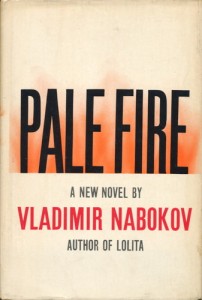 Alex Guy was assigned Vladimir Nabokov’s Pale Fire, the only book in the Songs about Books project to have been published in the twentieth century – all the others are relatively recent – and the only one that at this point is widely regarded as a classic, although at the time its critical reception was a bit chillier.
Alex Guy was assigned Vladimir Nabokov’s Pale Fire, the only book in the Songs about Books project to have been published in the twentieth century – all the others are relatively recent – and the only one that at this point is widely regarded as a classic, although at the time its critical reception was a bit chillier.
I was somewhat worried that this book would be a little bit more of a slog than the others so far, but now that I think about it I don’t know why. Nabokov’s work is not conventional by any means, but in my experience he is never not interesting, and always eminently readable. Despite the unusual structure of this book – which I’ll get to in a minute – I flew through it and was sorely tempted to go right back to the beginning and start again.
The book Pale Fire is composed around a 999-line poem by the fictional poet John Shade, who we learn quite early on is no longer with us. Before the poem is a short foreword by Shade’s friend, Charles Kinbote, who has also written extensive notes on the poem, which make up the bulk of the book. To say much more would be to say too much; one derives a huge amount of pleasure and consternation from unpacking Shade’s poem and Kinbote’s commentary, and from reading between the lines and then the lines between the lines to try and tease out what’s really going on here. I don’t even want to tell you how to read it; after reading Kinbote’s foreword I read the poem, checking back and forth with the appropriate notes as I went along. I then went back and read the whole poem on its own. But some might just read straight through – foreword, poem, commentary – and I’m sure that would have a different effect. (There is apparently an audio book of Pale Fire, which must make that choice for you one way or the other. I recommend against the audio book; if any book is meant to be read with one’s eyes, this is it.)
Pale Fire – both the poem at its center and the book as a whole – is an absolute delight to read on many levels. Nabokov was a brilliant man and a gifted writer, who could just as easily compose 999 poignant lines of iambic pentameter as weave a convoluted, compelling narrative, and of course tie it all together in such a way as to make you want more as soon as you’ve put it down. I really don’t want to say any more than this – and if you’re going to read it I wouldn’t pay too close attention to Alex’s wonderful lyrics for fear of giving away any surprises – but I heartily recommend you read this book, ideally before August 19th, but certainly soon.
Get your tickets now, and join us at the Fremont Abbey on August 19th to hear all of the Songs about Books and get a copy of the CD.
